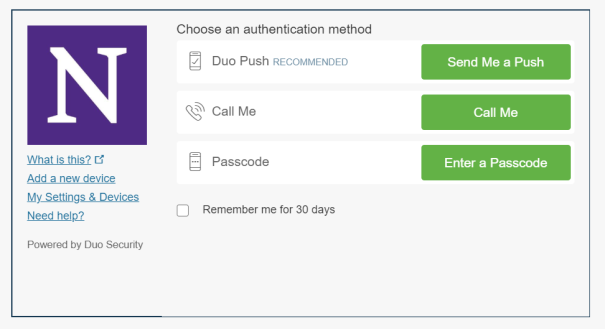The authentication process that you’re used to for CAESAR is now a part of accessing library resources. This extra layer of security is great for our users because when just one password on campus is compromised, the entire university can lose access to that resource. It has happened more than once.
The extra layer of security, called multi-factor authentication, is easy to use and might actually make you feel like you’re living in the future. The non-dystopian kind this time.
When you access a library resource, you’ll be prompted for your NetID and password, just like normal. You’ll then get a message that looks like this:

- Multi-factor authentication screen
This screen gives you three options for how to get to your resource, but only one of them is good: “Send me a push.” You click that, it sends a notification to your phone or your watch (more on that later), you hit “approve” and you’re in. Better yet, you can click that “remember me for 30 days” box and you won’t even have to do that much for another month.
The Duo mobile app is available in the app store or google play.
But I promised you that you could feel like you were living in a non-dystopian future. The app can push an alert to your phone, but it can also push an alert to your apple watch. That means you can be sitting at your laptop, request a push and see this:

My wrist, coming to you from the future
You can hit “approve” on your wrist and never have to figure out where your phone is. Just sit back and imagine yourself as one of the Jetsons.
Please feel free to contact the library if you have any trouble with multi-factor authentication. So long as you use the Duo app, I think you’ll find it’s a seamless and easy experience.
